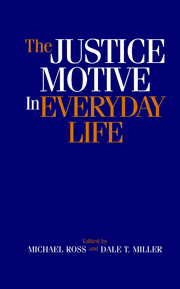Book contents
- Frontmatter
- Contents
- List of Contributors
- Introduction
- Theoretical Perspectives on the Justice Motive
- Victim Derogation and the Belief in a Just World
- 7 Why We Reject Innocent Victims
- 8 Helping and Rationalization as Alternative Strategies for Restoring the Belief in a Just World: Evidence from Longitudional Change Analyses
- 9 Violence in the Workplace – The Explanatory Strength of Social (In)Justice Theories
- 10 The Just World and Winston Churchill: An Approach/Avoidance Conflict about Psychological Distance When Harming Victims
- The Justice Motive and Prosocial Behavior
- Justice-Based Reactions to Transgressors
- Justice and Reaction to One's Own Fate
- Name Index
- Subject Index
10 - The Just World and Winston Churchill: An Approach/Avoidance Conflict about Psychological Distance When Harming Victims
Published online by Cambridge University Press: 08 September 2009
- Frontmatter
- Contents
- List of Contributors
- Introduction
- Theoretical Perspectives on the Justice Motive
- Victim Derogation and the Belief in a Just World
- 7 Why We Reject Innocent Victims
- 8 Helping and Rationalization as Alternative Strategies for Restoring the Belief in a Just World: Evidence from Longitudional Change Analyses
- 9 Violence in the Workplace – The Explanatory Strength of Social (In)Justice Theories
- 10 The Just World and Winston Churchill: An Approach/Avoidance Conflict about Psychological Distance When Harming Victims
- The Justice Motive and Prosocial Behavior
- Justice-Based Reactions to Transgressors
- Justice and Reaction to One's Own Fate
- Name Index
- Subject Index
Summary
How do people respond when they observe a victim's undeserved suffering, such as when competent, hardworking employees are laid off for reasons that have nothing to do with their performance? Lerner's famous just world hypothesis (e.g., Lerner, 1980; Lerner & Simmons, 1966) addressed reactions by non-harmdoing observers, such as outsiders who learn about the suffering of laid-off employees. We instead address the case of harmdoing observers, such as the managers who lay off the employees. In the Lerner analysis, witnesses to a victim's undeserved suffering “will be increasingly likely to reject that victim as a function of the degree of injustice associated with the victim's fate” (Lerner, 1980, p. 56). Because victims received derogatory ratings under the predicted conditions, this form of rejection is known as victim derogation. Other possible responses – such as prevention, restitution, and acceptance of one's limitations – Lerner called rational tactics. Nonrational tactics that involve variations on the theme of ego defense, of course, constitute the more interesting category from a psychological perspective. These include denial/withdrawal and reinterpretation. Derogating a victim is a special case of the latter – namely, a reinterpretation of the victim's character. Other psychological defenses in the same category (nonrational tactics) include reinterpreting the outcome and reinterpreting the cause. In the original Lerner and Simmons (1966) paradigm, the observer was innocent and powerless.
- Type
- Chapter
- Information
- The Justice Motive in Everyday Life , pp. 168 - 186Publisher: Cambridge University PressPrint publication year: 2002
- 8
- Cited by



